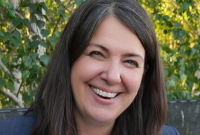Support strong Canadian climate journalism for 2025
Premier Danielle Smith, with Alberta enjoying billions of dollars in surplus cash, announced Tuesday a batch of inflation-fighting relief aid, particularly for families, seniors and the vulnerable.
"Due to our strong fiscal position and balanced budget, we can offer substantial relief so Albertans and their families are better able to manage through this storm," Smith said in a provincewide TV address, her first since winning the United Conservative Party leadership to become premier in early October.
Smith's office later put the cost of the aid package at $2.4 billion.
The changes involve payments along with an expansion and continuation of programs brought in earlier this year by former premier Jason Kenney.
The key new initiative: $600 payouts.
Middle to lower-income families — those with a household income of less than $180,000 a year — will get $600 for each child under 18 over six months. The same income threshold and benefit applies to seniors.
The $600 payout will also go to those needing income support and those receiving help under programs including Persons with Developmental Disabilities and Assured Income for the Severely Handicapped, better known as AISH.
Alberta will proceed with previously announced promises to re-index benefits for seniors and those receiving money under support programs like AISH.
Those benefits, along with personal income tax brackets, were de-indexed by the United Conservative government in 2019 under Kenney. He said such indexing was not sustainable with the province running multibillion-dollar deficits.
That financial situation has since reversed. Alberta is on track for a $13-billion surplus this year due to rebounding oil and gas prices, with an update on the budget coming Thursday.
To further help Albertans, the province in the spring stopped collecting its 13-cents-per-litre tax on gas at the pumps. The government has since started adding some of that tax back, as oil prices receded, but Smith said the full tax break is now back for at least the next six months.
Alberta households, farms and small businesses have been getting a monthly $50 rebate on electricity bills since July. Smith said the government will increase the rebate "totalling an additional $200 per household."
The province already has a program in place to rebate natural gas bills if heating costs spike. That program remains in place but the trigger point has not been hit yet.
There will also be help for food banks and low-income transit passes.
In her speech, Smith also renewed promises to fix long wait times and ambulance bottlenecks in health care, and to challenge the federal government by introducing in the house next week an Alberta sovereignty act.
Smith has said the act — now renamed the Alberta sovereignty within a united Canada act — will assert the province's ability to ignore federal laws it deems unconstitutional but in a way that respects the courts and the Constitution. Constitutional experts question how that can be done legally and Smith has not explained how she plans to make it work.
Opposition NDP Leader Rachel Notley, in an online video, said the premier and her promises can't be relied upon.
"What we just heard was Danielle Smith claiming she's going to undo the affordability crisis that the UCP government has actually contributed to by reversing many of their own bad decisions," said Notley. "We're not buying it, and neither should you."
Political scientist Duane Bratt said Smith was astute to offer aid to those most in need rather than a broad payout that would see everyone, including high-income earners, get $600. But he said she should have kept the focus on money for inflation rather than diluting it with broad promises on health care and her sovereignty plan.
He said Notley didn't immediately respond to Kenney’s previous inflation fighting plan but took to social media immediately after Smith's address to rebut her statements.
"It shows we're six months from an election and everyone is in election mode," said Bratt, who's with Mount Royal University in Calgary.
The next general election is scheduled for May 29, and recent polls suggest Smith is lagging behind Notley's NDP.
Smith has been criticized for comments embracing pseudo-science, particularly as it relates to COVID-19, and for past musings embracing pro-Russia talking points in its war with Ukraine.
"I know that I am far from perfect, and I make mistakes," Smith said in the address.
"Having spent decades in media and hosting talk shows, I discussed hundreds of different topics, and sometimes took controversial positions, many of which have evolved or changed as I have grown and learned from listening to you.
"I know I'm not a talk-show host or media commentator any longer.
"My job today is to serve each and every Albertan with everything I have and to the best of my ability, however imperfect that may be at times."
In recent days, the NDP has challenged Smith to explain whether she plans to follow through on a policy paper she wrote last year in which she urged introducing health spending accounts as a way to open the door to a care system built on out-of-pocket payments, co-pays and insurance-style deductibles.
Smith's government is working on health spending accounts, with details coming in the February budget, but she says they will only be for non-medicare help, such as naturopaths and counselling.
"I'm committed to public health care," Smith said on her Twitter account Sunday.
The NDP said Smith needs to directly reassure Albertans, given that in her policy paper, written in June 2021 for the University of Calgary, Smith said Alberta can no longer afford universal social programs funded wholly by taxpayers.
She wrote that health spending accounts are a good way to begin conditioning people to the idea of paying and fundraising for some of their own care.
This report by The Canadian Press was first published Nov. 22, 2022.




Comments